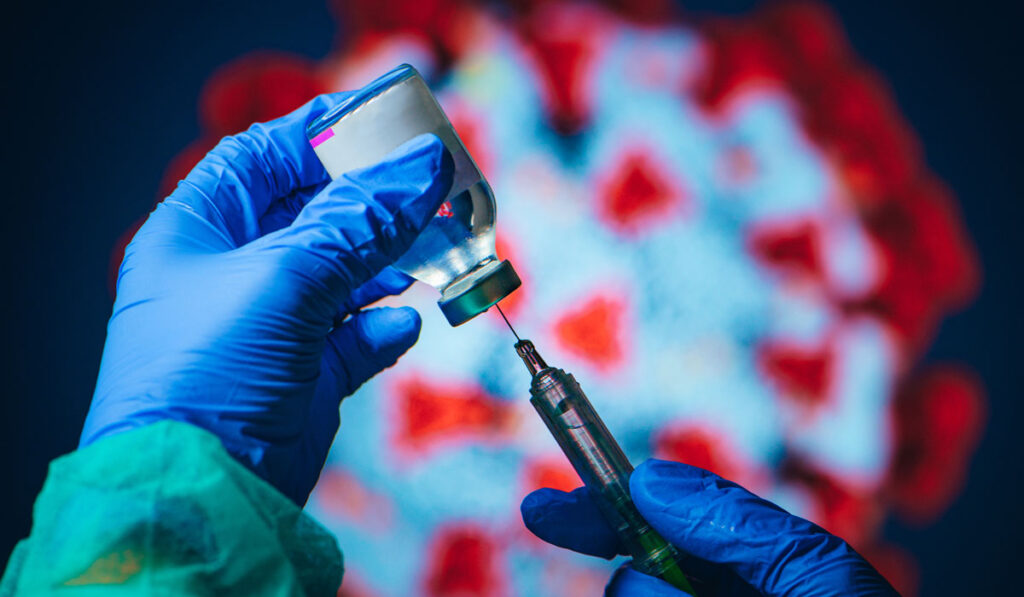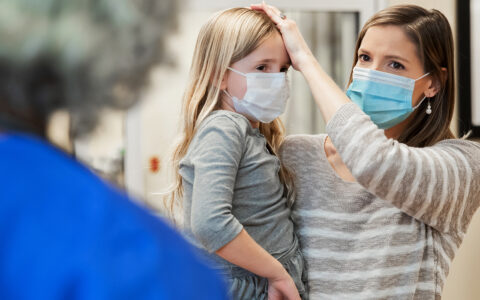Vanderbilt University Medical Center and the Monroe Carell Jr. Children’s Hospital at Vanderbilt are meeting the challenge of COVID-19 locally, nationally and globally. In the early days of the pandemic, when critical reagents were unavailable, Vanderbilt harnessed the ingenuity and collaborative spirit of its staff to ramp up its rapid testing capability.
Since then, Vanderbilt scientists and clinicians have helped develop COVID-19 treatments and vaccines, refined clinical practice for treating seriously ill children, and played a highly visible role in public health and health equity efforts aimed at controlling the pandemic, particularly for those most severely affected.
“There are literally thousands of people who have been working on this effort across the country and around the world,” said C. Wright Pinson, MBA, M.D., Deputy CEO and Chief Health Systems Officer at Vanderbilt. “I want to tip my hat to all of those people who have made such great contributions here at Vanderbilt.”
Early Vaccine Input
Buddy Creech, M.D., a specialist in pediatric infectious diseases who directs the Vanderbilt Vaccine Research Program, is directing phase 3 clinical trials of two different COVID-19 vaccines. Mark Denison, M.D., director of the Division of Pediatric Infectious Diseases, helped conduct early testing that led to approval of the Moderna vaccine last fall.
Denison, an internationally known expert on coronaviruses, also helped demonstrate the potential for the antiviral drug remdesivir to reduce the severity of illness in COVID-19 patients. The efforts of a team of VUMC pharmacists and physicians were pivotal in facilitating early, statewide distribution of remdesivir last spring.
Pediatrics faculty member James Crowe, Jr., M.D., director of the Vanderbilt Vaccine Center, is also well known for the development of monoclonal antibodies that can seek out and neutralize viruses in the bloodstream with laser-like focus. Two COVID-19 antibodies isolated in Crowe’s lab have been optimized by AstraZeneca and are in phase 3 clinical trials.
Crowe’s efforts to develop ultra-rapid pandemic response tools is funded by the Defense Advanced Research Projects Agency of the U.S. Department of Defense (DARPA), and was featured in a CBS “60 Minutes” broadcast on Sunday, April 11, 2021.
Adult and Pediatric Care
Vanderbilt contributed to national studies showing that hydroxychloroquine, which had been highly touted as an effective treatment for COVID-19, did not significantly improve clinical outcomes in hospitalized patients or protect health care workers from infection.
Another national study led by Vanderbilt researchers is testing whether infusions of convalescent plasma, collected from COVID-19 survivors and containing SARS-CoV-2 antibodies, can help patients hospitalized with COVID-19.
In the area of clinical practice, pediatric surgeon Harold “Bo” Lovvorn III, M.D., and colleagues are investigating whether SARS-CoV-2, the virus that causes COVID-19, can be spread through microscopic droplets and particles during minimally invasive surgery in children.
Pediatric infectious disease experts Ritu Banerjee, M.D., Natasha Halasa, M.D., and Sophie Katz, M.D., have led efforts to improve the diagnosis of multisystem inflammatory syndrome in children, a rare but dangerous COVID-19 complication, and pediatric endocrinologist Justin Gregory, M.D., recently reported the risk for severe illness from COVID-19 is tripled in patients with diabetes.
Response to Health Inequities
Socioeconomic factors and lack of access to health care are important contributors to the disproportionately severe impact of COVID-19 on communities of color. Even before the pandemic, Vanderbilt experts were leading efforts to improve health equity, diversity and inclusion.
Consuelo Wilkins, M.D., Vice President for Health Equity at Vanderbilt, is leading an effort to coordinate the full resources of the health system to identify and respond to COVID-19 care inequities. The COVID-19 Command Center team has developed a systems approach and unique dashboard which allow them to evaluate race, ethnicity, and language (REAL) and social determinants of health (SDOH) data along with information in the EHR.
Raising Public Awareness
Among Vanderbilt’s most visible and potentially impactful contributions to meeting the COVID-19 challenge is the unflagging efforts of its infectious disease and public health experts to raise awareness about the importance of masks and social distancing.
One of the most widely recognized faces on network television, William Schaffner, M.D., professor of preventive medicine, has repeated this vital message hundreds of times, averaging 15 interviews a day.
At the local level, Alex Jahangir, M.D., director of the Division of Orthopaedic Trauma, chairs the Metropolitan Board of Health of Nashville and Davidson County, and the Metro Coronavirus Task Force. He has helped articulate Nashville’s response to the pandemic during frequent news conference appearances.
Many Vanderbilt adult and pediatric faculty have been instrumental in getting the word out. Like Schaffner and Jahangir, their goal is to raise awareness about the crushing burden of COVID-19, and what must be done—by all of us—to stop it.




